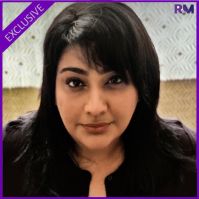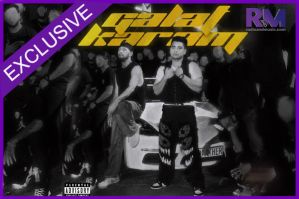Irshad Khan - 'Unfortunately there is some kind of racism in the music industry worldwide'

Irshad Khan is considered among the world's best Sitar players and the leading Surbahar (BassSitar) player of his generation. First recognised as a child prodigy, today he has emerged to be among the most sought after and versatile Indian musicians of India. With uncompromising dedication in training both vocally and instrumentally, he has gained proficiency in classical vocal. Irshad Khan has achieved phenomenal control in combining the intricacies of "gaiki-ang"(vocal) with the "tantra-ang" (instrumental) styles, which has made him one of the world's most dynamic musicians of today. On the occasion of his latest album, Desires - Talking Hearts, Radioandmusic.com's Aaishwari Chouhan engages in conversation with Irshad Khan on a wide range of issues.
Excerpts:
Your association with different artistes like tabla player Himdol Majumder has left a benchmark in the musical scene today. There certainly is some amount of identity conflict that happens when performing with multiple artistes. How do you deal with that?
I've had almost 28 albums till date and around 90 per cent of them were classical. I did fusion too recently. In most of my albums, I am the only male artist. So my voice stands out distinctly.
So it is quite understood with the audience that they are listening to Irshad Khan. Even while performing live, people usually recognise me by my voice and hence, there comes no point of identity conflict for me at this point of time.
An ancient musical instrument like the Surbahar breathe music today, thanks to you. What's your relation with this instrument?
Surbahar is basically a bass sitar. It was invented in the 17th century by my great, great grandfather who was a court musician at Shah Jahan's court. He was the only one who played Surbahar at that time. Today, in my generation, I am proud to be the one to play it. It is played in purely classical compositions.
What's your vision for the industry?
My vision is to bring in quality and traditional classical music to the forefront. I also aim to enhance the quality of music people are currently listening to. I believe, music isn't just to shake one's hips to. If one's soul dances along with the movement in the hips, that's when the music has truly gotten into the individual. And this in true terms is good music!
Whenever you do fusion or a jazz performance, you do it with full knowledge of western music. This in true terms is a sincere performer. What does it take to be sincere to yourself and to the audience? .
Without good knowledge about any particular topic, one can't really talk or perform on it. And hence, I believe that one should have enough knowledge before s/he performs. And when it comes to music, one just can't blend two different forms of music for the heck of it. And this is where knowledge makes a difference. Without proper knowledge, the performance will look really weird.
And I don't have full knowledge of western music, with every composition and performance, my knowledge just keeps increasing. No one practically can have full knowledge about anything.
You excel at different sub-genres of classical, jazz, blues and as a composer too. So what are you most comfortable at?
I am most comfortable performing classical because I feel classical is the most sophisticated form of music. It is the kind of music that reflects feelings and emotions.
Do you have any Bollywood aspirations?
Well, if a film comes my way, I would be game for it. But then, Bollywood is the kind of thing wherein you need to be involved in its circle to excel as a composer.
Would you go down to judge any of these singing competitions?
Yeah, why not! These competitions provide a platform to budding singers, but at the same time they are also a big money-making gimmick.
How about starting a training academy in India or overseas?
I already have two of my training institutions overseas - one at Toronto and one at upstate New York. Here I have Indian as well as a lot of non-Indian students. I am looking forward to setting up such institutions in India as well, but since I keep traveling most of the times, it would be really tough to manage. But trust me; a training academy in India would be like a dream come true for me.
You have a very strong musical background. As a child and a student, did you differ on musical issues with your father as a teacher or you simply accepted what was bestowed on you?
I was born in Calcutta, my house there was like a temple. My grandfather introduced Sitar to Bengal at that point of time, around 100 years ago. So, I always wanted to be a sitar player. I not only learnt but lived music. It was in the atmosphere. I used to accompany my dad during his performances on stage and my first performance happened at the age of seven, followed by a performance in one of the most popular fests of Punjab when I was nine years old. I did my international debut at the age of 13.
It was quite easy for you. But for a newbie, how does an Indian artiste break into overseas markets?
It's simple. Catch the right people, organise yourself, send your demo to those 'right' people and wait for their response on the same. For an Indian artiste, it is also very important to package oneself rightly. And in the process of packaging, one must remember that only practice makes a man perfect. Without enough and good practice, the quality suffers and the international market is not ready to compromise on the quality of music the artiste provides.
Are labels here willing to invest in classical music artistes?
Unfortunately, no! Here they are looking for mere commercial gimmicks. The artists are suffering in return. They should realise that ultimately only classical music will last for long. I believe government, media and the corporate industry need to back us up.
Have dropping music CD sales affected classical / instrumental music sales as well? What's your personal experience?
Yes, they have! There is also a decline in the music sales due to piracy. To overcome the losses, the music needs to be properly marketed in the scenario where the markets are declining.
Is it easy for instrumentalists to get a break in the record industry without a mentor?
It totally depends on the kind of work the artiste does. Today, what matters the most is if the artiste can be sold. If he can be, then there is no need for an influential mentor.
Do live performances help grow the equity of an artiste?
Definitely! An artiste truly grows through live performances. It is also the best way of approaching the audience. The equity of an artiste is also highly dependent on the media.
How big is the classical music market with respect to finances and audience?
In India, the Indian classical market is less than five per cent in strength but worldwide it is highly in demand. If there is any market which is most popular from India, it is the classical market. Around 90 per cent of my shows, outside India, are organised by non-Indian fans of mine. So you can guess the popularity and fondness for classical music worldwide.
Is there racism in the music industry worldwide too?
As far as I know, unfortunately there is some kind of racism in the music industry worldwide. Although I haven't experienced it myself, I have heard a lot about it from some fellow singers.
What would you like to add about Desires - Talking Hearts?
Desires - Talking Hearts is made for the common man. The music is not just about a sitar and tabla, but has an amalgamation of different sounds that sound appealing to the ear.

















